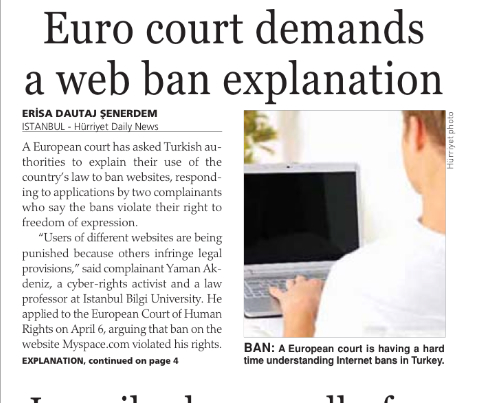Hurriyet Daily News: European court asks Turkey to explain its Internet bans
Wednesday, March 9, 2011
ERISA DAUTAJ ŞENERDEM
ISTANBUL – Hürriyet Daily News

A European court has asked Turkish authorities to explain their use of the country’s law to ban websites, responding to applications by two complainants who say the bans violate their right to freedom of expression.
‘Users of different websites are being punished because others infringe legal provisions,’ said complainant Yaman Akdeniz, a cyber-rights activist and a law professor at Istanbul Bilgi University. He applied to the European Court of Human Rights on April 6, arguing that the Turkish government’s ban on the website Lastfm.com.tr violated his rights.
The decision to consider the case is a landmark one, Akdeniz said, explaining that it was the first time the court had taken up a complaint related to Internet bans.
‘The court’s final decision will set an important precedent for all Council of Europe member countries,’ Akdeniz told the Hürriyet Daily News & Economic Review on Wednesday.
Responding to the applications by Akdeniz and another Turkish complainant, the European court issued a request last month to Turkish authorities, asking them to answer by June 9, three questions of a general nature about the use of Turkish law to ban certain websites.
‘The court asked Turkish authorities for explanations regarding the application of legal provisions to ban websites,’ Akdeniz told the Daily News.
Fellow complainant Ahmet Yıldırım, a 28-year-old doctoral student at Boğaziçi University in Istanbul, applied to the European court Jan. 12, 2010, saying his personal website on Google Sites, which he used to publish his academic work, had been banned by Turkey. Both Akdeniz and Yıldırım said they appealed to the European court after having exhausted all domestic legal avenues.
Both applications were made before Turkish authorities’ recent ban of the popular blogging platform Blogger. The website, a property of Google Inc., was blocked in response to a complaint by the satellite television provider Digiturk about bloggers illegally posting football matches broadcast on Digiturk’s Lig TV channel.
The decision to ban Lastfm also involved a rights dispute; authorities used Turkish Law No. 5846 on artistic and intellectual works to issue the ban, arguing that the site had been used to illegally publish artistic works to which the user did not own the rights.
According to Akdeniz, who initiated the Lastfm-related case, authorities should identify and punish individuals who break the law, rather than punishing all Internet users by issuing blanket bans on websites.
Lastfm was banned in Turkey on Sept. 19, 2009, following a lawsuit brought to court by the Turkish Phonographic Industry Society, or MÜ-YAP.
In his complaint related to Google Sites, Yıldırım argued that Turkish authorities sought to ban access to the website for breaching provisions of Turkish Law No. 5651, on the regulation of publications and copyright infringements on the Internet. He said this violates his right to freedom of expression, guaranteed by Article 10 of the European Convention on Human Rights.
Turkey’s controversial Internet bans have been a subject of much debate by experts as well as by millions of Turkish Internet users who have lost access to popular sites. Experts have criticized the implementation of Law No. 5651 and related laws to ban websites, saying that those who break laws must be tracked down and punished for their actions, rather than making all Turkish internet users pay the price.
Questions from the European court
The first question posed to Turkish authorities by the European court was related to Akdeniz’s application. ‘As a user, can Mr. Akdeniz claim to be a victim of an infringement to rights guaranteed by Article 10 of the Convention?’ it asked.
Another question dealt with whether the complainants’ freedom of expression had been infringed upon, particularly their right to receive or communicate information or ideas according to Article 10, Paragraph 2 of the Convention. The European court also asked Turkish authorities whether Turkish law permitted it to put an end to unjustified infringements on freedom of expression, and whether it had responded to the demands of Article 13 of the Convention.